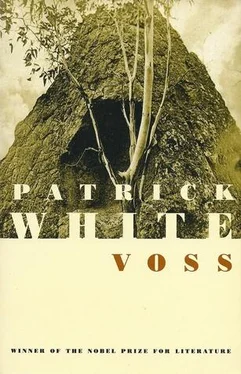‘I must remember on some more appropriate occasion to tell you what has detained us,’ Mrs Bonner whispered, and hinted, and smiled. Then, raising her voice to a rather jolly pitch: ‘But delay will not detract from our enjoyment; first glances assure me of that.’
No one had ever thought to remind her at a later date of her offer to explain, so perhaps ladies do respect one another’s stratagems. For Mrs Bonner, in the belief that fresh flowers will catch the eye when others are beginning to wilt, always arrived late at a ball.
‘Belle is radiant,’ said Mrs Pringle, accepting the part she was to play.
‘Belle is looking well,’ said her mother, as if she had but noticed.
‘Will you not agree that she is the loveliest girl in Sydney?’ asked Mrs Pringle, who could be generous.
‘Poor Sydney!’ protested Belle.
At times she would grimace like some ugly boy, and even this was acceptable. But, on the present occasion, she returned very quickly to her high, white cloud.
‘And Laura,’ added Mrs Pringle, kindly.
For Laura Trevelyan was also there.
Belle Bonner at once sailed out with Mr Pringle, an ugly man, who smelled of tobacco, but respected for his influence and money. Belle was wearing satin for tonight, smoother than the music, whiter than the silences, for most men, and even conspicuously pretty girls stopped talking as she floated near. In their absorption, those who knew her intimately would not have obtruded the reality of their relationship. They only thought to support themselves on their own, prosaic legs, and watch Belle as she danced past.
There was also Laura Trevelyan.
Laura was wearing a dress that nobody could remember when asked to do so afterwards. Only after much consideration, and with a feeling that what they were saying had been dragged up from their depths and did not properly fit their mouths, some of them replied that the dress was probably the colour of ashes, or the bark of some native tree. Of course, the dress did not match either of these descriptions. It was only that its wearer, by the gravity of her face and set of her rather proud head, did make a sombre impression. Although she replied with agreeable directness and simplicity to all those who dared address her, few did, on account of some indefinite obscurity that they sensed, but could not penetrate, or worse still, because they began to suspect the presence of darkness in their own souls. So they were for ever smoothing their skins, and ruffling up their pink or blue gauze in mirrors, before allowing themselves to be thrown together again by that mad wind of concealed music. They, the larkspurs of life, were only appreciable in masses.
At one point Laura was approached by Chattie Wilson, a plump, and rather officious girl, who was always giving good advice, who knew everything, who went everywhere, always the bridesmaid, but who had been overlooked, it seemed, because she was so obviously there.
Now Chattie asked:
‘Are you not enjoying yourself, Laura?’
‘Not particularly,’ answered Laura. ‘To be perfectly candid.’
Chattie giggled. To confess to the sin of not enjoying was something she would never have dared, so she pretended that she did not believe.
‘Are you not well, perhaps? There is quite a respectable sofa in the retiring-room. Quite clean . You could put your feet up for a little. I will come and sit with you, if you like.’
Chattie was most anxious to be of service to her friend, for, in spite of her relentless pursuit of enjoyment, at times she did suspect that enjoyment refused as relentlessly to be pursued.
Then Laura replied:
‘Are you really able to lie down on the sofa and be cured? Ah, Chattie, how I do envy you!’
This was the sort of thing that people did not like in Laura, and Chattie giggled, and dabbed with her handkerchief at the perspiration on her upper lip.
‘Oh, well,’ she said, and giggled again to stop the gap.
But Laura was grateful to her rather suety friend.
‘Come,’ she said, touching Chattie, because it cost her an effort. ‘Let us stand over there and watch, near that column, where we shall not be seen.’
‘Oh, dear, no,’ said Chattie, for whom it was a first duty to be noticed, and was propelling her friend up a short flight of steps leading to a little dais, from which prizes were distributed after the term’s dancing classes, and on which chairs had been arranged in a bower of flowers. ‘One does not accept to go to a ball simply to hide behind a column.’
‘Will it do us any good to sit exposed in the open, like a target?’ Laura asked.
Chattie knew that targets were designed for arrows, but contained her thoughts.
‘If we do not actually benefit by it, we can come to no positive harm,’ she was careful to observe.
So they seated themselves.
It was Belle’s night. Belle was everywhere, in her white dress, almost always and inevitably in the arms of Tom Radclyffe. Other dancers made way, encouraging her presence in their midst, as if she had been a talisman of some kind, and they would have touched her magic dress. As she danced, sometimes she would close her eyes against the music, although more often she would hold them open, expressing her love in such lucid glances that some mothers considered it immodest, and Laura, intercepting the touching honesty of that almost infinite blue, was afraid for her cousin’s safety, and wanted to protect her.
Or herself. She shuddered to realize that love might not remain hidden, and was nervously turning her head this way and that. She was most alarmingly, chokingly exposed. Her neck had mottled.
When the man approached so quietly, and bowed so civilly, she could have cried out, to ward off that being who, from his very modesty and reasonableness, might possibly have understood.
‘It is very kind,’ she said, in a loud, ugly voice. ‘Thank you. But I am not dancing.’
‘I do not blame you,’ he replied. ‘I am never surprised at any person not wishing to dance. It is not sociable, for one thing. It is not possible to jig up and down and express one’s thoughts clearly at the same time.’
‘Oh,’ said Laura, ‘I had always been led to understand that the expression of thought was the height of unsociability.’
Chattie Wilson laughed rather bitterly. She was hating everything.
Then Laura Trevelyan introduced Dr Badgery, surgeon of Nautilus , to Miss Chattie Wilson, and felt that she herself was absolved from further duty.
But his expression would not leave her in peace. Although his voice would be engaged with Chattie Wilson, it was not Chattie whom he was questioning.
‘Tell me, Miss Wilson,’ he said, ‘are you well acquainted with the country?’
‘Oh, dear, no. I have been very seldom into the bush. It is different, of course, if one marries; then it may become a matter of necessity.’
Miss Wilson did not intend to waste much time on Dr Badgery, who was neither young, nor handsome, of moderate means, she suspected, and not quite a gentleman. If she did not also recognize sympathy, it was because she was not yet desperate enough.
‘I would give anything to satisfy my curiosity,’ he said.
‘You should join some expedition,’ advised Chattie, and tried anxiously to be recognized by someone nice.
‘Such as left last year,’ she added, for she had been well trained, ‘under the leadership of that German, Mr Voss.’
No expedition, it appeared, would be led to the rescue of Chattie Wilson.
‘Ah,’ said Dr Badgery. ‘So I have heard. Tell me about him.’
He was looking most intently at Chattie, but would be turned at any moment, Laura knew, to intercept her distress.
‘I did not make his acquaintance,’ Chattie replied, but remembered at once. ‘Laura did, though.’
Читать дальше












